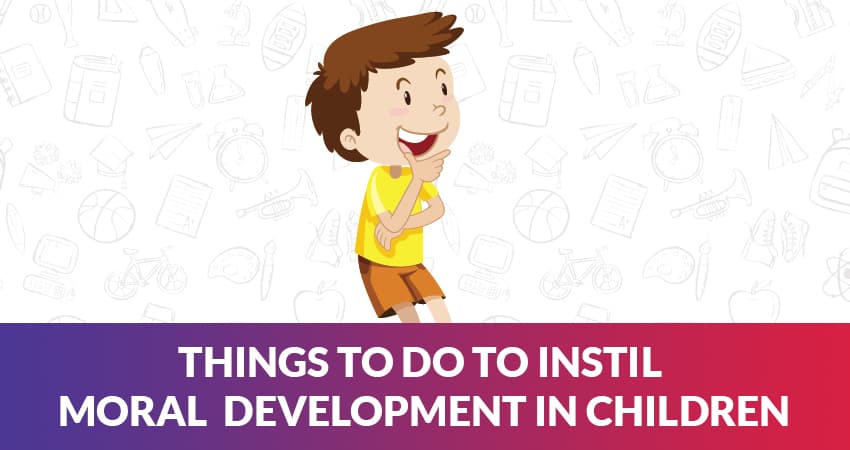Moral Development in Children-Stages and What Should You Do
By orchidadmin |
Date 09-08-2024

Table of Contents
Admissions Open for
Introduction:
Teaching children to know right from wrong and making good choices is crucial for their development. From an early age, parents play a key role in helping children understand morals and compassion. While it may seem like there are many immoral people in the world, there are countless good individuals who help others and make the world a safer place. Teaching children moral values from a young age is important, as it becomes harder as they grow older. Parents can instill these values by setting a good example, teaching empathy and kindness, and reinforcing positive behavior as children learn and grow.
Age 0-2
From a child, what feels natural at this age is what feels comfortable to do. They try to learn to vocalize their thoughts and use their limbs. Though it seems like their brain is busy teaching the body the basic necessities to survive, like walking and eating, a little of morality can be learned, too. And don’t forget. This is the stage where a child learns from the mother by imitating her. So feed a stray in the streets or birds out in the garden. You may even give tasks to the child, like watering the plants. The child won’t understand these altruistic behaviors, as humans are innately selfish and naturally don’t do things that don’t benefit them in some form. But the child doesn’t have to understand the meaning at all. A simple exercise in imitation of the mother in performing good deeds is enough at this age.
Age 2-4

This is yet another stage where the child can just imitate the parents but not actually understand the why. It is fine because the parts of their brains where ‘reasons’ are contemplated are not yet fully developed. However, the child would have just started nursery, and it is a fine place to teach your child to practice good things. Ask the child to share their meals with other children or even teachers. When this happens, he/she will garner a lot of good attention in their nurseries, which they will grow to like. And if a child is failing to follow your instructions, a simple and harmless punishment will do the trick. Though a child can’t understand why doing what mommy refers to as ‘good’ brings them nicer experience in life and ‘bad’ gives them not-so-nice experience, he will link good deeds to nice, bad to unpleasant. Forming this sort of neural network early in childhood will make the child look at ‘bad’ things vehemently and do only good.
Age 5-10
In this stage, a lot of morality can be taught. Children become relatively reasonable. Get a cat or a dog and set an example of how to treat animals right. Take the child to local parks and make them hell the homeless. When children see the less fortunate side of the world, they begin questioning the inequalities in it. As they bombard you with questions about it, you shall teach them that it is the duty of every human to take care of every other human. That we live in this world together, as kin, and we all should act like it. When children learn that if they keep what they need and give away what they don’t, and if everyone in their generation follows the same, there won’t be inadequacy in mankind. Toys, food, clothes, all of these can be donated to someone who will gratefully receive them, giving your child a highly nurturing exercise in morality.
Age 10-16

The final stage any parent can impart any sort of knowledge in a child is this age bracket. From 16 to mid-twenties, children want to defy parents and go against what we tell them to. So this final stage is crucial. Get your child his/her own dog. Make them participate in soup kitchens or similar activities, where they come in contact with the poor directly. All of this must be done without your supervision, as children at this age will want the autonomy and approval of their peers. But if you have done an amazing job until now and raised a morally strong child, he is okay to be left alone because his decisions will be solely based on what is right and what is wrong.
Conclusion
The points above are not that difficult to follow. Essentially, it is just a reminder to tag your child along whenever you do something altruistic. Watching and copying is children’s inborn skill to survive. And when they watch their parents do a lot of moral things, they will surely try to do them. As they grow, they will also understand the reason behind it, which is making this world a better place.
Also read..
Early childhood brain development has lifelong
CBSE Schools In Popular Cities
- CBSE Schools in Bangalore
- CBSE Schools in Mumbai
- CBSE Schools in Pune
- CBSE Schools in Hyderabad
- CBSE Schools in Chennai
- CBSE Schools in Gurgaon
- CBSE Schools in Kolkata
- CBSE Schools in Indore
- CBSE Schools in Sonipat
- CBSE Schools in Delhi
- CBSE Schools in Rohtak
- CBSE Schools in Bhopal
- CBSE Schools in Aurangabad
- CBSE Schools in Jabalpur
- CBSE Schools in Jaipur
- CBSE Schools in Jodhpur
- CBSE Schools in Nagpur
- CBSE Schools in Ahmednagar
- CBSE School In Tumkur

Call Us to know more about Orchids
Swipe Up



.jpg&w=1920&q=80)












